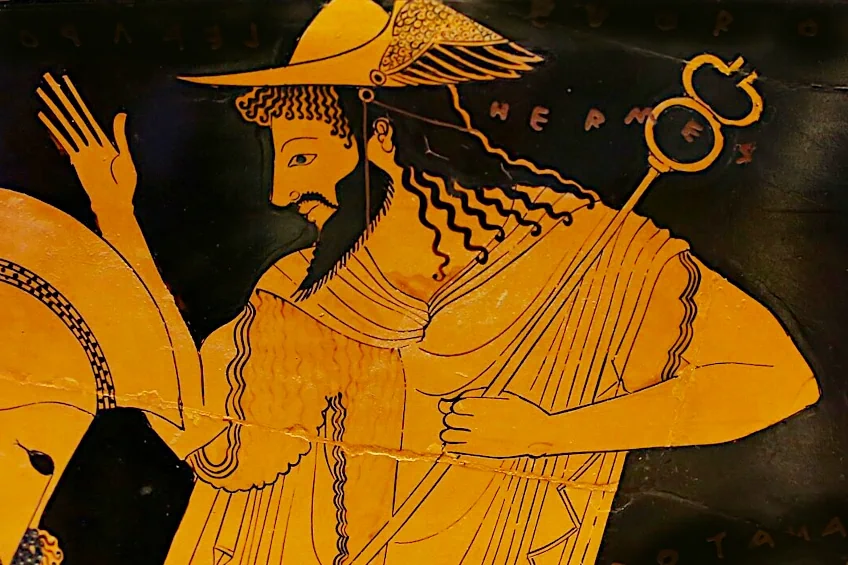“At a time when man was still at the initial stages of his civilisation and his thought had not yet consciously come to serve objective truth, the resort to myth was the only way to supply an answer to the questions which exercised him”
Stavropoulou, M. (1997) Greek Mythology: Gods and heroes – the Trojan War – the Odyssey.
Hermes was a god in Ancient Greek Mythology known for a vast many things. A trickster and a master of thievery, he garnered such an image after stealing fifty of Apollo’s cattle on his first day of life.
He was considered the God of trade and commerce, protector of travellers and roads, and often regarded as a bringer of profit and luck. With his ability to move freely between the divine and mortal worlds, Hermes was also responsible for the souls of men, conducting the dead from this life to the next, in his duties as a Psychopomp.
And whilst he exhibited cunning, agility and quick-witted deceit, was adept in diplomacy and language, Hermes – son of Zeus and the eldest Pleiade Maia – was also known for his role as messenger of the Gods. Adorned with winged sandals and Petasos (his hat), Hermes would move swiftly between realms, delivering messages and conducting negotiations, primarily for Zeus but also amongst other gods.
He is frequently portrayed carrying the Caducaeus – a winged staff entwined by two serpents (often mistaken for Asclepius’ rod as an image of medicine and healing). The Caduceus depicts a symbol of authority in Hermes’ communicative duties, establishing his role as emissary and mouthpiece of the chief deity, conveying commands to other gods and humanity. While Ancient Greek Mythology remains a prevalent influence in contemporary society, particularly within the confines of the arts and popular culture, there may be more discreet ways such myths speak to today’s world.
If one tries hard enough they could force an intersection of any two subjects, but as a creative with a moral aversion to the growing presence of AI in professional communication, I couldn’t help but wonder what our Heralding God might make of Artificial Intelligence. There were said to be many Heralds in Greek Mythology, responsible for making proclamations known, however I’m specifying Hermes in this context of contemporary communications, strictly due to his widespread influence from language and literature to popular culture and geographical associations.
The history of communication has evolved from oral custom and scribes to news ballads, legacy press, and an array of methods in between, all with the intended process of information exchange. Before there was AI in news reporting and storytelling, social media had developed to offer an open-publishing, multi-way method of engagement in the palm of your hand. Indeed, an arena that just about anyone can participate freely within might lay the foundation for democracy and free speech, however the omnipresent threat of misinformation and disinformation remains a valid one.
While social media was established with connection at its core today’s reality presents a perpetual feed of algorithm-driven content fighting for eyeballs in a vast attention economy. It is fast becoming a tool for passive consumption rather than public engagement, raising the question of whether social media has empowered or diluted truthtelling. As a domain it is difficult to regulate and loopholes make proposed bans potentially redundant. And as more AI-generated content bleeds into the algorithm, so do the risks and limitations it presents. The United Nations has recognised threats to press freedom while factual inaccuracies, bias, ethical implications and even weaponised disinformation have become realised pitfalls in how we communicate today.
But AI can also be an incredibly useful tool for professionals, enhancing and simplifying as one requires, improving efficiency and transforming industries or technology to help tackle some of the planet’s greatest challenges. Though one fact that will not change, regardless of the extent to which it evolves, is that AI is incapable of emotion and critical thinking. It cannot replicate intuition or embody the anthropomorphic traits Hermes was thought to have wielded. A supreme liaison of sorts, he was entrusted to impart dialogue between gods and humanity, not unlike the responsibility shouldered by a great number of correspondents who consider journalism as their calling, rather than a profession.
Naturally, I plugged a prompt into ChatGPT asking what Hermes might think of Artificial Intelligence, and was nothing short of amused by its response. An air of self-righteousness presented in its suggestion that Hermes might admire AI’s speed, boldness and capacity for interpretation, “marvelling at humanity’s cleverness” for creating an ingenious tool which accelerates the exchange of language and mimics thought.
“Yet, the trickster in him would also delight in AI’s ambiguity: a tool that enlightens and deceives, empowers and confuses.”
It is thought that Hermes ‘lives in the mind(s) of those who can communicate complicated webs of information with simplicity,’ and this is a task tools like ChatGPT are often employed for. It’s also something journalists were doing long before AI was developed, though without the tendencies of deception and confusion.
Without limiting him to his role as Zeus’ emissary, and instead considering the god for all he encompasses, Hermes’ adaptability, ingenuity and inclination for transition may suggest a tendency to approve the rise and evolution of AI’s use in communicative media. His diplomacy, eloquence and grandiosity might have produced an ego to bemoan the duties of a deity now being undertaken by insentient computational systems. However he likely wouldn’t have an opinion on the matter at all because the nature of Mythology suggests it is just that. Myth.
Despite his mischievousness and thievery, Hermes was revered and a well-liked jack of many trades. Nevertheless I would think it wise to consider the messages of a trickster with a healthy dose of skepticism. If for no other reason than finding value in nuance and striving to think critically about what we’re being fed, much like we ought to do with our approach to AI.





















